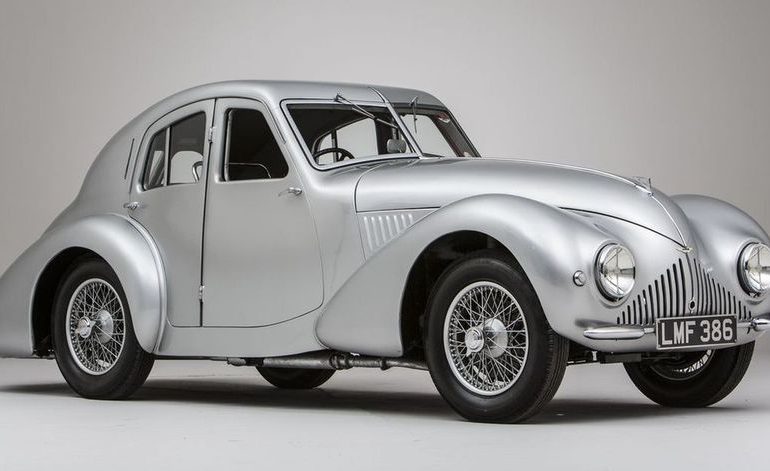Aston Martin Atom
1939 – 1944
Although stylistically unlike both previous or future Aston Martins, the chassis and method of construction was very much the basis for the post war Feltham cars starting with the 2 litre sports (DB1) right up to the DB Mark III in 1957. It might look a bit awkward to our eyes today but this was due mostly to the lack of availability of materials during wartime. To the people of the time, Atom would have looked very modern indeed.
Initially the Atom was fitted with a 4 cylinder 1950cc Single overhead cam engine with Zenith carburettors from the 15/98 but by the end of the war, this had been replaced by a 4 cylinder 1970cc Claude Hill designed pushrod engine with twin SU carburettors. The engine was attached to a 4 speed Cotal self-changing semi-automatic gearbox with a pair of electromagnetic clutches, quite advanced for the time.
The Atom had a very active life of development during the war years clocking up over 100,000 miles, so that as soon as peace came, the company had a new product to sell to it’s customers. The problem was that although Aston Martin was, just for once, on sound financial footings and profitable, a considerable sum would be needed to develop the sort of car demanded by post-war, mostly overseas consumers. Thus AM owner, Gordon Sutherland put the company up for sale through a classified advert in The Times newspaper in 1946. David Brown, the Yorkshire based businessman and head of the engineering firm, the David Brown Corporation showed interest and Sutherland drove the Atom to his HQ in Meltham for his approval. DB drove the car and must have been sufficiently impressed as he went on to purchase Aston Martin, a company that he owned for the best part of the next 25 years. The Atom disappeared from view for quite sometime before turning up in France of all places during the 1970’s.
After being exhibited in French motor museums, including the famous ACO museum at the Le Mans circuit, it was returned to the UK in 1985, reappearing at many AMOC and prestigious international events. The 10 year restoration involved conserving as many original parts as possible rather than simple replacement . The grille on the Atom, if one can call it that, may, perhaps, be interpreted as the earliest expression of the distinctive Aston Martin shape we know so well today. To be honest, I’m not so sure, but the shape has a passing similarity.




